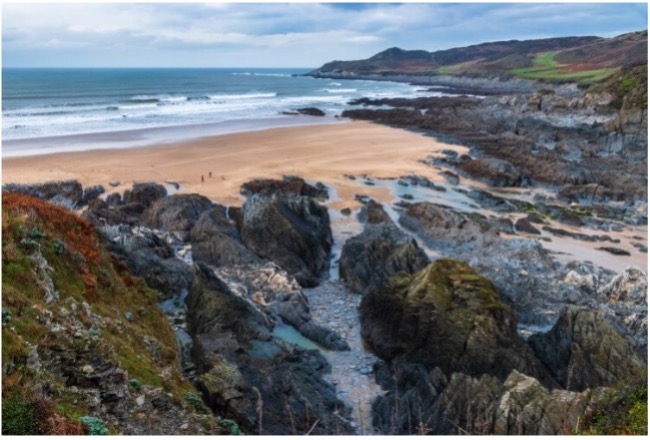Jenny’s letter 23rd June
Dear Friends,
As many of you know, I was brought up in North Devon, not far from a very beautiful but rocky coastline. The area also has some of the best sandy beaches in the world. Saunton Sands is internationally famous for surfing as is Croyde Bay.
Andrew and I were rarely taken to these places. North Devon beaches are busy and Croyde can be dangerous with rip tides caused by the rocks on either side. We regularly saw the search and rescue helicopter fly over our heads taking casualties from the beach or the cliffs to the local hospital. When we went to the beach, often after others had gone home so that the roads were quieter and there was a chance of a parking space, we would clamber down a steep path, go over the rocks and find ourselves on an almost deserted shingle beach called Barricane (see picture). When the tide was up there was only shingle and rock pools. I learned to swim in a particularly large one.

It was around the time of the Torrey Canyon Disaster (1967) just off the North Cornish Coast. At that time it was the worst oil spillage in history. The clean-up operation made matters even more serious by the amount of dangerous chemicals that were sprayed on the area. For us, the consequence was that shoes and clothes and towels very often picked up lumps of crude oil. We were taught to try and avoid the sticky blackness, though inevitably it often got on somebody. It made your skin sore and that was before it was scrubbed off your body!
I write about all this because Sunday’s gospel reading takes us to the Sea of Galilee, also known as the Lake of Gennesaret. To be certain of clarity, this is an inland lake and not an area of the coast. It is the world’s second lowest lake (The Dead Sea is the only one lower) and 700 feet below sea level.
It is surrounded by small villages and the location of Jesus’s Sermon on the mount and where Peter walked on water, that is until he took his eyes off Jesus! (Matthew 14). On another occasion, the disciples were crossing the lake in a boat when a huge storm came. The account of Jesus calming the waves is the subject found in Mark 4. Verse 35 to the end. You will know that we are told Jesus slept through the early part of the storm until the disciples woke him and he calmed the waves. How scared they were and might have expected sympathy from their teacher. Instead he says to them, ‘Why are you afraid? Have you still no faith?’ Of course, they were astounded by his power over nature and said, ‘Who is this, that even the wind and the sea obey him.’ Even though they had responded to his call on their lives, even though they had seen the miracles he was doing they still struggled to put all their trust in him or The Father from whom he came. This is such a human reaction isn’t it? Speaking personally, although my faith is deep and strong I am still amazed by the miraculous and full of fear on occasion.
So how does my upbringing in Devon relate to the Bible account that I have just referred to? I have always seen a tiny glimpse of the enormity of Almighty God in the power of the sea. Even on sunny days the waves have great power to knock down and destroy the largest of vessels and the most experienced of surfer or swimmer. There is a rumble that comes with a rough sea and a crashing sound that is heard as the waves break on the particularly hard and jagged rocks associated with that area.
Interestingly, the Sea of Galilee is not only unusual for how far it is below sea level but also because of the remarkable and sudden changes in weather it can have. Because the Golan heights are to the north, huge storms can be whipped up in a few minutes just as the lake can also be suddenly becalmed. Fishermen, like many of the disciples, would have lived with the fear of either event as it would affect both their safety and their livelihood. You couldn’t just switch on the motor and chug to the next village. You had to row or wait. You lived at the mercy of nature and the understanding of God the Creator was imminent (close to them). I think we lose sight of that in our busy human-made existence. Having said that, the weather in Bromborough is tidal and we often experience several changes in a day because of that. Do you notice?
Another thing I learnt from my early experience of the sea is how humanity can mess up nature. When the Torrey Canyon spilt its oil, 170 miles of mostly British Coastline was damaged. Around 15,000 sea birds were destroyed as well as marine life over 270 square miles. On top of that 10,000 tons of solvent emulsifiers were sprayed onto the area with a toxicity that is hard to quantify in the long term. As I was learning about the awesome power of God, I was also seeing the ability of mankind to mess up the good that God has entrusted to us.
Thankfully, the coastline has recovered. Out of an awful situation new rules and guidance has come for transporting oil and other chemicals as well as legislation around the cleaning up disasters at sea. Again and again we see how God redeems what mankind destroys though we still live with the consequences of our actions both individually and collectively.
On Sunday you will hear more about the calming of the storm but for now, be thoughtful. Hear the word of the Lord. Look at where he is working, redeeming, changing. You may not always ‘feel’ God but we need to use our knowledge of him to assess the situation we are in. Remember that he is all just, all loving, and all merciful. Go and read psalm 145 8-13, and Micah 6 and 7. These are some of the places we can read he about who God is but we will also learn what the Lord requires of us.
Wishing you every blessing in the week ahead,

